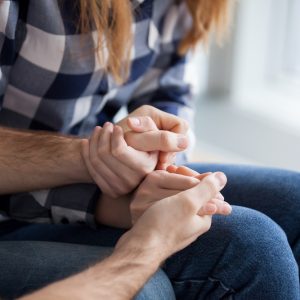The Positive & Negatives of Grief Support Groups

After the death of a loved one, most grieving people get a popular recommendation. Friends or co-workers often suggest they visit a grief support group. Obviously, this, like mourning rituals, is a popular recommendation for a reason. Support groups can be pivotal to anyone dealing with loss, trauma, addiction or illness. They can be extraordinarily beneficial for those dealing with grief. However, like anything, there are cons as well as pros.
Of course, this is not to discourage anyone coping with loss from seeking out a support group. They can be incredibly healing and provide a safe space for people to share their pain without fear of judgement. However, there are certain attributes to support groups that some should be aware of. In this post, we’ll break down the positives and negatives of grief support groups. Keep reading to find out more.
3 Negatives of Grief Support Groups
1. They Can Be Overwhelming
Obviously, it can be so helpful simply being around people dealing with the same issues you are. Knowing that you’re not all alone in your pain is a therapeutic notion in itself. However, sometimes it can be a little too much for the most vulnerable among us. If you’re feeling extreme sensitivity, sometimes being surrounded by a lot of profound emotions can feel very overwhelming.
Therefore, you should always be completely aware of how you’re feeling in the presence of other people before visiting a grief support group. It may simply be too early for you to be there.
2. They Can Discourage You
When we visit support groups of any kind, it’s because we’re looking for guidance, emotional support and proof that things get better. This is especially true for those of us in the earliest stages of grief, who have lost a spouse or someone equally important to us. However, if we attend a support group and find only sadness, anger and other negative emotions, it might mislead us into believing that the pain never goes away. If those present in the group express pain, we can naturally assume that’s all that’s in store for us.
Keep in mind that bad days can happen to anyone, no matter how long it’s been since suffering a loss. A particularly bad day can kick up old feelings of anger and loss. However, this doesn’t mean you’re doomed to feel only these emotions for the rest of your life.
3. Incorrect Information
While we may attend a support group expecting only enlightened beings with all the answers, that’s not the case. You will find tremendous benefits in the wisdom of many group members. However, you may also find a lot of bad information about how you should feel, what you should expect, and how you should be navigating your grief. Remember: the group members are human beings, and subject to the same flaws as everyone else.
3 Positives of Grief Support Groups
1. Hope
Someone in an early stage of their grief, when they visit a support group, encounters people who are years ahead in their healing. In fact, most of these support groups are administered by people who have coped with the same kind of loss. Therefore, these members who are flourishing and finding ways to heal can have a tremendously hopeful influence on those who have recently suffered a loss.
Veteran group members are often proof that we will feel upbeat and optimistic again, and this is reason enough to visit a support group.
2. Identification
Perhaps the best reason to visit a support group is identification. Grief can feel debilitating in its loneliness and isolation. When we’re suffering such profound pain, it can be easy for us to feel like we’re the only ones who have ever felt this way. Therefore, attending a support group provides us a brand-new (and very necessary) perspective. It opens our eyes to the fact that we’re not alone.
Other people know exactly how we feel and what we’re going through, and are living proof that there is life beyond grief. When we’re feeling at our lowest, grief support groups provide us a landscape of empathy, understanding and hope.
3. Community
As human beings, we feel an inherent need to belong. Being a part of a group, fellowship or even a Facebook group of any kind simply feels great. In a support group, we find acceptance and a sense of validation. In addition, this kind of community provides us with the future opportunity to give back what we were given in the beginning of our grief. The death of a loved one can mislead us into believing we’re all alone. However, a support group confirms that we do belong, and we do have a community that cares about our well-being. This alone can be incomparably valuable to anyone who’s dealing with grief.
Conclusion – St. Charles Monuments
At St. Charles Monuments, we know how important it is to use every available resource to help you through your grief. Here, we provide our Long Island community with custom monuments in order to commemorate the lives of those they love. For more information on St. Charles Monuments or our services, contact us today!





